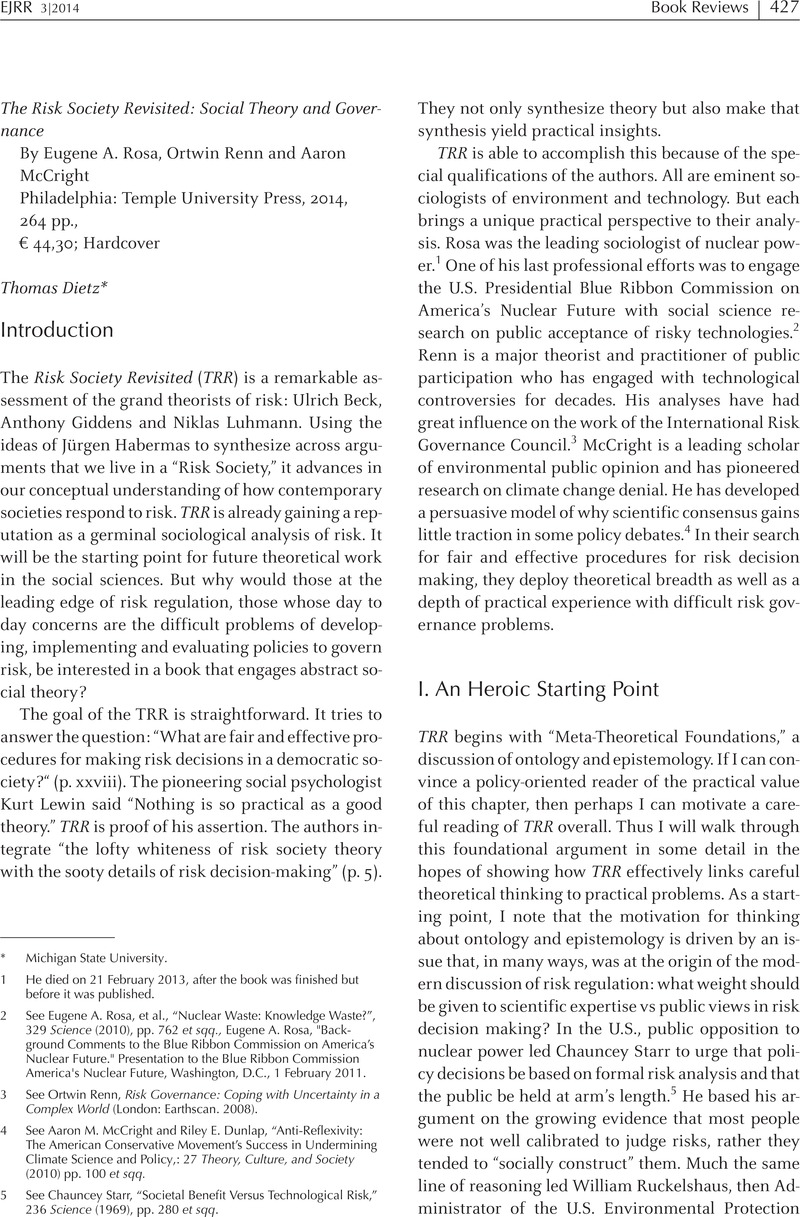No CrossRef data available.
Published online by Cambridge University Press: 20 January 2017

1 He died on 21 February 2013, after the book was finished but before it was published.
2 See Rosa, Eugene A., et al., “Nuclear Waste: Knowledge Waste?”, 329 Science (2010), pp. 762 et sqq., CrossRefGoogle ScholarPubMed Rosa, Eugene A., “Background Comments to the Blue Ribbon Commission on America’s Nuclear Future.” Presentation to the Blue Ribbon Commission America's Nuclear Future, Washington, D.C., 1 February 2011.Google Scholar
3 See Renn, Ortwin, Risk Governance: Coping with Uncertainty in a Complex World (London: Earthscan. 2008).Google Scholar
4 See McCright, Aaron M. and Dunlap, Riley E., “Anti–Reflexivity: The American Conservative Movement's Success in Undermining Climate Science and Policy,: 27 Theory, Culture, and Society (2010) pp. 100 et sqq. Google Scholar
5 See Starr, Chauncey, “Societal Benefit Versus Technological Risk,” 236 Science (1969), pp. 280 et sqq.Google Scholar
6 See William D. Ruckelshaus, Science, Risk and Public Policy (Speech to the National Academy of Sciences, 22 June 1983).
7 See Rosa, Eugene A., “Metatheoretical Foundations for Post–Normal Risk,” 1 Journal of Risk Research (1998) pp. 15 et sqq Google Scholar., Terje Aven, et al., “On the ontological status of the concept of risk,” 49 Safety Science (2011) p. 1074 et sqq.
8 By my rough estimate about half a million times per year every year for decades.
9 See Dietz, Thomas, “Epistemology, Ontology, and the Practice of Structural Human Ecology”, in Thomas Dietz & Andrew K. Jorgenson (eds.) Structural Human Ecology: Essays in Risk, Energy, and Sustainability (Pullman, Washington: Washington State University Press, 2013), pp. 31 et sqq Google Scholar.
10 See Dewey, John, The Public and Its Problems (New York: Henry Holt. 1923).Google Scholar
11 On early arguments for deliberative processes in environmental and risk policy, see Dietz, Thomas, “Theory and Method in Social Impact Assessment,” 57 Sociological Inquiry (1987), pp. 54 et sqq.CrossRefGoogle Scholar, Renn, Ortwin et al., Fairness and Competence in Citizen Participation: Evaluating Models for Environmental Discourse (Dordrecht: Kluwer Academic Publishers, 1995)CrossRefGoogle Scholar. For recent policy statements see: U.S. National Research Council, Understanding Risk: Informing Decisions in a Democratic Society (Paul C. Stern – Harvey Fineberg eds., Washington, D.C.: National Academy Press, 1996)Google Scholar, U.S. National Research Council, Public Participation in Environmental Assessment and Decision Making (Thomas Dietz & Paul C. Stern eds., Washington, D.C.: National Academy Press. 2008)Google ScholarPubMed, International Risk Governance Council, Risk Governance: Towards An Integrative Approach (Geneva, Switzerland: International Risk Governance Council, 2005).Google Scholar
12 U.S. National Research Council Public Participation, supra
13 U.S. National Research Council Public Participation, supra
14 See Rosa, Eugene A., et al., “Risk and Sustainability: A Look at two Global Threats,” 3 Solutions (2012), p. 59 et sqq.Google Scholar
15 See Dietz, Thomas, “Bringing Values and Deliberation to Science Communication,” 110 Proceedings of the National Academy of Sciences (2013), pp. 14081 et sqq.CrossRefGoogle ScholarPubMed